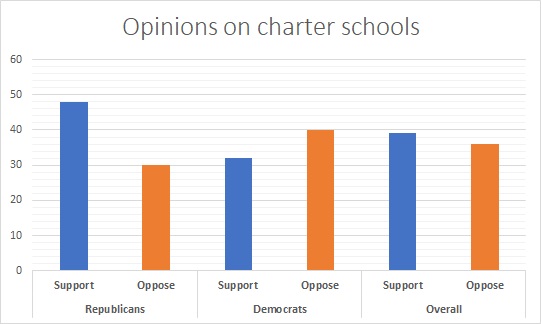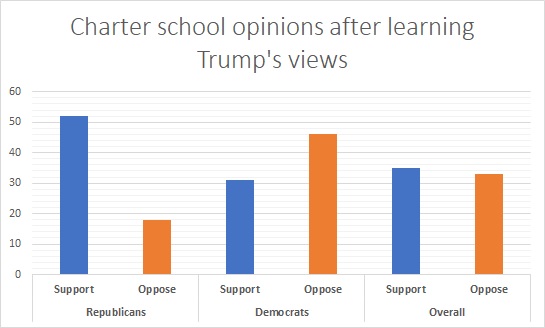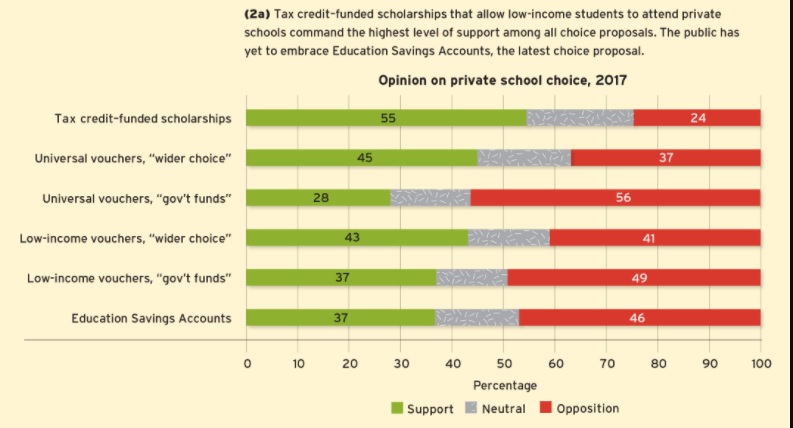Ever since Donald Trump became president, opponents of school choice have tried to tie charter schools, vouchers and scholarship tax credits to the polarizing politician.
A new public opinion survey suggests those tactics might not be working as intended.
Survey researchers with Education Next asked questions about two school choice policies two ways. Half the respondents answered basic questions about whether they supported tax credit scholarships or charter schools. The other half were asked the same questions, after being told Trump supports the policies.

Associating the policies with Trump didn’t change overall support for either policy. But it did tend to polarize issues. Support among Democrats went down, while support among Republicans went up.

The poll confirms something school choice advocates saw on the ground during last year’s elections.
Take Florida state Rep. Manny Diaz, R-Hialeah, for example. Over the past several years, he’s been a key backer of legislation that expanded charter schools, created new virtual education options and increased private school choice.
He’s also a former public school administrator who pushed to reduce regulations on traditional public schools and supported five straight years of funding increases. But that didn’t matter. Democrats and teachers unions made him and his heavily Hispanic, Democratic-leaning seat a top target. They repeatedly tried tying him to Trump and using his school choice record against him.
It didn’t work. Diaz distanced himself from Trump. He won re-election and out-polled his party’s presidential standard-bearer at every single precinct in House District 103.
Still, the polarizing power of Trump helps explain why teachers unions and other opponents of private school choice are trying to associate school choice policies with Trump. They might not make the policies less popular, but they could use him to drive liberals and progressives out of the school choice tent.
And the poll contains some worrying signs. Support for charter schools fell 12 percentage points from a year ago. EdNext Editor-in-Chief Martin West told reporters that’s “one of the largest single-year changes in opinion that we’ve seen,” on any issue, in the poll’s 11-year history.
West said he suspected the general anti-charter climate, from the contentious confirmation hearings of Education Secretary Betsy DeVos to fresh scrutiny from groups like the NAACP, may be a factor.
Vouchers and tax credit scholarships did not see similar swings in popularity. This should give pause to charter school backers trying to distance themselves from private school choice in the Trump era.

But it’s worth noting that much of the attacks from teachers unions and their allies have centered specifically on “vouchers” — a term that doesn’t show up in the survey questions. Instead, the survey simply asks a pair of questions about programs that help families pay for private school tuition.
In other words, perhaps some of the negativity around vouchers hasn’t carried over to the more general concept of school choice.
And here, again, Diaz’s experience may be instructive. He faced relentless attacks over his support of “for-profit charter schools.” They emphasized his job at a private college the charter management company Academica uses to offer dual enrollment courses in charter schools it operates.
Those programs have proven popular with students. And research shows the Academica-run Mater Academy charters in Hialeah have helped their students make substantial gains on reading and math tests. Indeed, they’ve helped their city rise to the no. 1 spot in a national index of educational equity.
In other words, it’s easy, and sometimes effective, to attack charters and private school choice in the abstract. Those attacks might be less likely to work in communities where those options are actually working.


